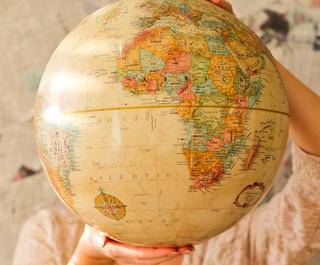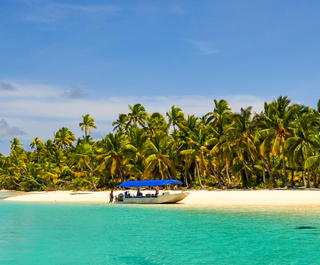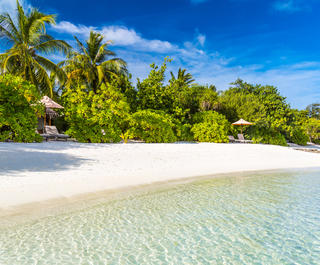
Let’s face it, after the last year and a half, no one’s itching more for a holiday than parents! With New Zealand's travel restrictions due to ease further in 2022, the new world of travel may seem like a minefield. That’s where we come in, to help you navigate travelling with kids during COVID, whether domestically or overseas. New rules and requirements now make travel more complicated, so we’ve pulled together all the information you need to get your family ready to travel safely again.
Keep reading to find out:
- Is it safe to travel with kids during COVID?
- NZ travel restrictions
- Travelling abroad? Be sure to check destination travel rules
- COVID testing – what tests do kids need?
- Helpful tips for travelling with kids during COVID
- Additional NZ travel and health resources
Is It Safe To Travel With Kids During COVID?
Over the past two years, the travel industry has been forced to adapt to new regulations put in place to keep travellers safe, and you’ll definitely notice some changes the next time you and your family arrive at an airport, board a flight or check in to a hotel.
When travelling within New Zealand or internationally, you’ll likely be required to wear masks both in the airport and on board your flight. Note that things differ between airlines. For example when flying with Qantas on international flights, children under 12 are exempt. And Jetstar is similar with children under 12 not having to wear a mask when flying between New Zealand and Australia and all domestic New Zealand flights (over 12 years have to wear a mask however, unless you have a medical condition that exempts you).
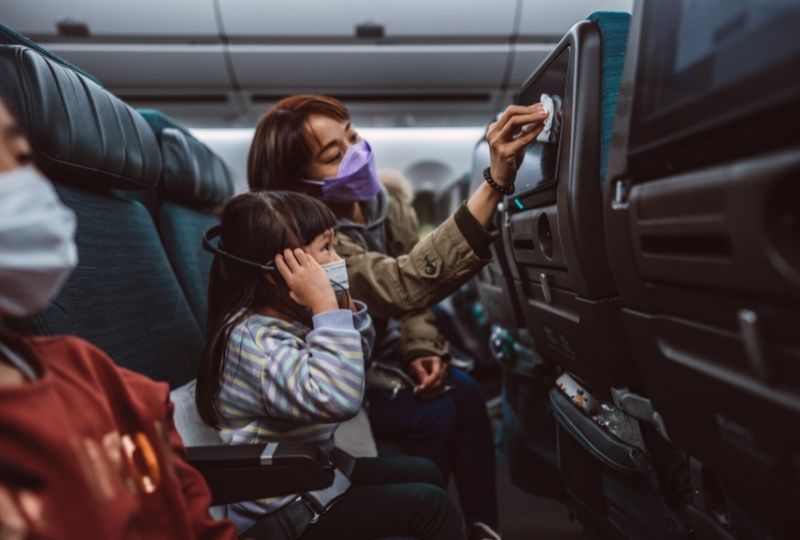
Individual airports, airlines, hotels, tour operators and cruise lines are all responsible for putting their own safety measures in place, so procedures and protocols will vary between operators.
New Zealand Border Restrictions
Leaving New Zealand
The New Zealand Government is urging New Zealanders who are overseas to register with SafeTravel.
When you travel overseas you will more than likely need to show proof of vaccination. Anyone 12 years and over who has had any dose of the COVID-19 vaccine administered in New Zealand can request an International Travel Vaccination Certificate either online through the Ministry of Health’s My Covid Record or by calling 0800 222 478.
Most countries require you to have a negative COVID-19 test result before you leave New Zealand.
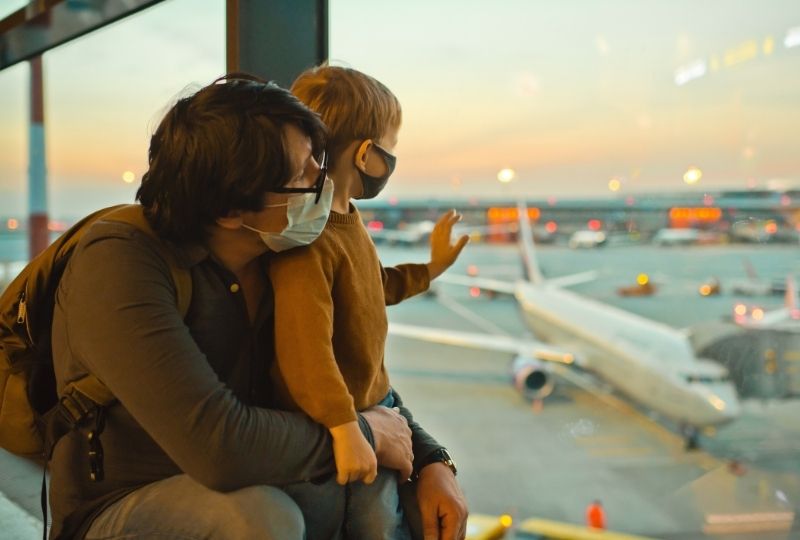
Returning to New Zealand
At the time of writing, everyone entering New Zealand (except from the Cook Islands) must complete a potentially costly 14-day stay in MIQ (Managed Isolation and Quarantine).
However, from 28 February 2022 fully vaccinated New Zealanders and other eligible travellers (and unvaccinated children under 12) who have spent at least 14 days in Australia, will be able to enter New Zealand without entering hotel quarantine. Under this arrangement, you and any children you’re travelling with will be required to self-isolate at home for 10 days on your return from Australia.
And from 14 March 2022, the same arrangement will take place for all other countries, which means you will be able to travel again, bypass MIQ and self-isolate at home instead.
For both of these steps above, to re-enter New Zealand, you and every child you’re travelling with over the age of 24 months will need to have proof of negative COVID-19 tests returned within 48 hours of your departure. Children under 2 will not be required to take a pre-departure test.
You will also need to take 2 rapid antigen tests (RATs) during your self-isolation period on day 0/1 and day 5/6 and declare your results.
Be Sure To Check Destination Travel Rules
You can check the requirements of the country you are travelling to by contacting their local high commission, embassy or consulate in New Zealand. It’s crucial that you carefully check your destination’s rules and restrictions, particularly if you’re travelling with children.
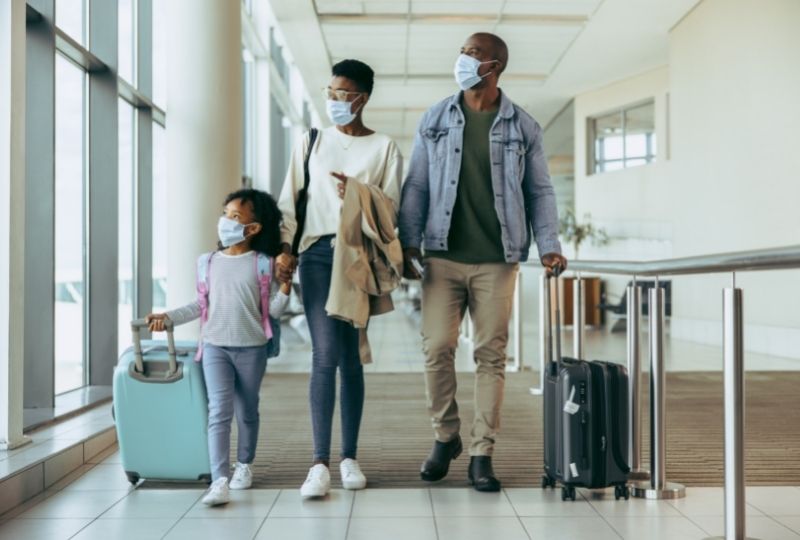
Here are a few of the top destinations for New Zealand travellers and their current entry requirements for families.
Cook Islands
From 14 January 2022 quarantine-free travel will be available between New Zealand and the Cook Islands. This means travellers between the two destinations won't have to go into managed isolation or self-isolation on arrival.
All travellers must be fully vaccinated included children from 5 years old (which is the age they are eligible to get vaccinated from in New Zealand). And from 1 March 2022, kids under 5 will also be allowed to enter the Cook Islands without being vaccinated (as they are not eligible).
All travellers will need to provide a negative PCR test taken no more than 48 hours prior to departure to the Cook Islands.
All visitors must also have been in New Zealand for a continuous period of at least 10 full days before departure. You must also complete a Cook Islands contact form no more than 96 hours before departing New Zealand as well as contact tracing while in the Cook Islands.
Australia
On 1 November 2021, one-way quarantine-free travel became available between Australia and New Zealand. This means fully vaccinated travellers heading to participating Australian states and territories from New Zealand don’t have to quarantine, but travellers to New Zealand from Australia still have to. The good news is unvaccinated children under 12 can also access the Australian quarantine-free arrangement. Arrangements are also in place in some states to allow unvaccinated or partially vaccinated children aged 12-17 years to enter Australia from New Zealand with a fully vaccinated adult.
The testing and quarantine requirements vary depending on which Australian state you are travelling to, so you need to check the applicable state government website.
To be eligible for the one-way quarantine arrangement you must have spent the last 14 days in New Zealand.
As mentioned above, two-way quarantine-free travel for vaccinated travellers between Australia and New Zealand will come into effect from 28 February 2022, with a 10-day period of self-isolation in New Zealand the only requirement (as well as tests).
All travellers (except children aged four years and under) entering Australia from New Zealand must present a negative PCR test taken within three days of departure.
All travellers (except children aged 24 months and under) entering New Zealand from Australia must present a negative PCR or RT-PCR pre-departure test. You need to have both the test samples taken and your results returned within 48 hours of your departure.
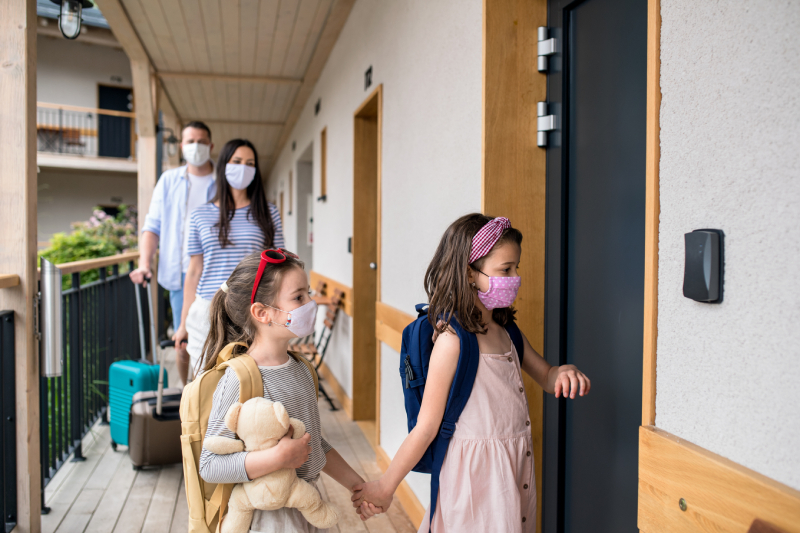
Samoa, Tokelau, Tonga and Vanuatu
There is also one-way quarantine-free travel available for New Zealand citizens or residents entering New Zealand from Samoa, Tokelau, Tonga and Vanuatu. You will need to have spent the last 14 days in one of these countries before departure. If you’re travelling from Tokelau, these 14 days can be spent in Tokelau, Samoa or New Zealand.
You don’t need to get a pre-departure COVID-19 test to enter New Zealand from Samoa, Tokelau, Tonga or Vanuatu.
Fiji
From 9 December 2021 certain travellers can visit Fiji without having to quarantine, provided they meet specific testing, vaccination and travel requirements.
To find out if you are eligible to enter Fiji and what requirements you and your family will need to meet, visit Travelling to Fiji and our international travel restrictions map.
At the time of writing, children under 18 may not have to be fully vaccinated as long as they are travelling with fully vaccinated parents or guardians and children under 12 may not need to show a negative PCR test result upon arrival. However travellers aged 12 years and over do need to present proof of a negative Covid-19 test taken within 2 days of departure. All travellers will also be required to have proof of a minimum of three nights prepaid accommodation and hotel transfers at a Care Fiji Commitment (CFC) certified property.
For the most up to date information, check the Travelling to Fiji website.
Be aware that, at the time of writing, there are no quarantine-free travel arrangements for travellers entering New Zealand from Fiji, so MIQ is still required on your return (due to change in March 2022 hopefully as above).
However, you don’t need to get a pre-departure COVID-19 test to enter New Zealand from Fiji.
COVID Testing – What Tests Do Kids Need?
COVID-19 testing is now a necessary part of travel. With so many different requirements, it can be hard to know exactly what tests you need and when in order to travel safely.
Testing requirements vary depending on your destination. The following types of pre-departure tests are acceptable for all countries – except Australia and very high risk countries:
- Nucleic Acid Amplification Testing (NAAT), which includes PCR, RT-PCR and TMA, or
- LAMP, or
- antigen test (they may also be referred to as viral antigen tests).
Travellers (excluding children aged 24 months or under) returning from Australia are required to get PCR or RT-PCR pre-departure tests. Travellers from very high risk countries must have evidence of negative nasopharyngeal RT-PCR (PCR) tests from an accredited laboratory.

As soon as your travel dates are confirmed, contact Healthline or your doctor. In most cases you’ll need to pay for pre-departure COVID-19 tests yourself, so make sure you factor this into your travel budget.
When returning to New Zealand, you and children aged over 24 months will need to provide a negative COVID-19 test result. You’ll need to have both the test samples taken and your results returned within 48 hours of your departure.
PCR (Polymerase Chain Reaction) and RT-PCR testing is not the same as rapid antigen testing, and will typically require you to make a booking and pay a fee.
Visit Unite against Covid-19 for more about Covid-19 testing for international travellers to and from New Zealand.
Helpful Tips For Travelling With Kids During COVID
Travelling with kids can be challenging at the best of times, but it is possible with just a little extra planning! Here are some other things to think about when planning your next family holiday.
- Wait times are likely to be longer than they used to be, so make sure to pack lots of distractions! Think colouring books, iPads, headphones, toys and snacks.
- Don’t forget to pack extra face masks, wipes and hand sanitiser.
- Make sure you purchase travel insurance that includes COVID-19 related-event cover before you go, to protect you and your family if anything goes wrong.
- Check the travel requirements for your destination (and any transit points) before you leave to avoid any unnecessary stress or delays or ask your Flight Centre travel expert to help you out with the whole process, it’s much easier and takes the stress out of planning your holiday.
For more helpful tips, see Travel with children and Flying With Kids: 15 Ways to Make it Easier.
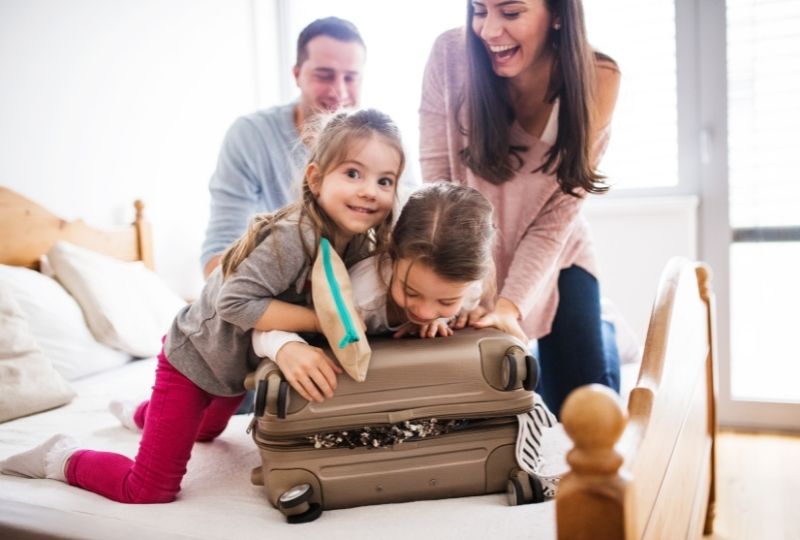
Additional NZ Travel And Health Resources
- Current travel restrictions
- International travel restrictions map
- Can I get insurance that will cover me for COVID-19?
- Travel with children
- Travelling to and within New Zealand | covid19.govt.nz
- Leaving New Zealand | covid19.govt.nz





